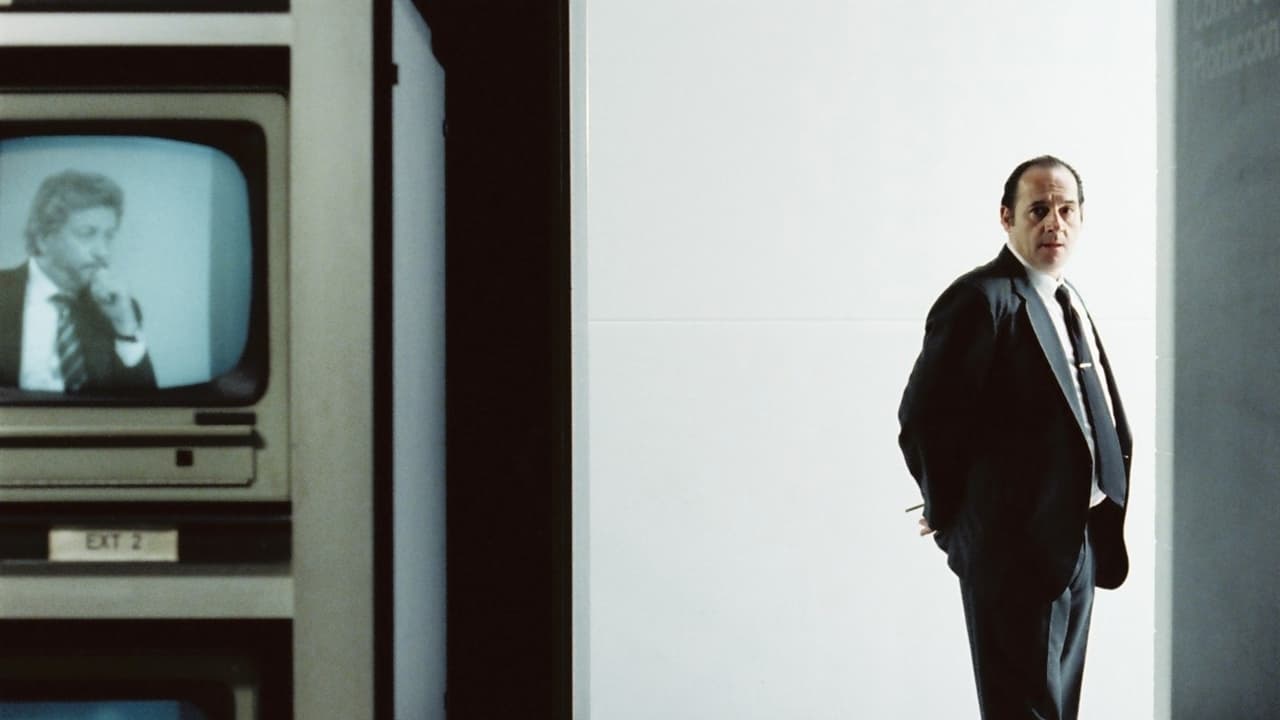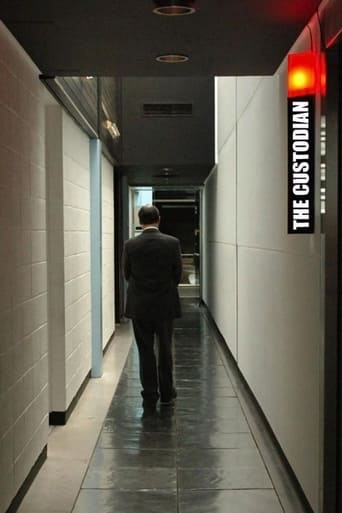

Disturbing yet enthralling
... View MoreI wanted to like it more than I actually did... But much of the humor totally escaped me and I walked out only mildly impressed.
... View MoreIt's an amazing and heartbreaking story.
... View MoreIt's the kind of movie you'll want to see a second time with someone who hasn't seen it yet, to remember what it was like to watch it for the first time.
... View MoreRuben, a bodyguard, for Artemio, the minister of planning in Argentina, is a man whose work appears to be waiting incessantly for a man that regards him as an imposed nuisance, a speck of dust on the floor, to put it mildly. In other word, Ruben, even though he is doing a job, what he does is not appreciated by his cold boss. There is never any meaningful exchange of ideas between the men, let alone any semblance of civility toward the man that is perhaps a step above a servant.This lonely man is constantly pacing outside the rooms where the meetings that demand the minister's presence takes place. He must stay alert, even when the boss is clearly seen with a lover through a window. Ruben's duty include guarding the minister as he entertains in his country estate, where he is seen as an intrusion no one in the household acknowledge. The only time we see any type of conversation involves a visiting foreign couple that are guests in the country. Wanting to impress the visitors, Artemio asks his bodyguard to sketch the visiting friend. It is made clear just by watching his morning routine that Ruben does not have any life of his own. He lives for his job. We follow Ruben as he visits his sister Beatriz in a hospital. It becomes clear the woman has some mental problems. Ruben, patiently listens to her rant, but never becomes involved in what the woman is saying. Ruben meets with his sister, and niece, and some guests at a Chinese restaurant, where Beatriz is not happy with the table they were given. She wants to move things around, something that exasperates her brother, complicated by the fact she wants her daughter, who has prepared a number, to sing it for her uncle, which she does so bad, no one in his right mind could endure.The only relief Ruben has is sexual release with a prostitute. He does it through a pimp, we see him following through a commercial gallery. The woman lives at home with her old mother, who is in a separate room as Ruben gets into the apartment. We watch the old woman coming to close the door of her daughter's room, as though she knows what is really going on.Things come to an unexpected end when Artemio suffers what appears to be a mild heart attack. Taken to a hospital, Ruben, who was reprimanded for not being in his post by one of the minister's aides, must stand guard outside the room. We watch Ruben's accumulated anger get the best of him in a surprising turn we were not even anticipating. Ruben's quest becomes to drive toward the ocean, something he never has experienced.Rodrigo Moreno the writer-director of "El Custodio" understood perfectly the character of the man at the center of the story. Life has passed Ruben by. He is an ordinary man who suffers from chronic loneliness, which he cannot shake, but in accepting what life has given him, he is ignored, belittled, and treated like dirt by a system that wants only achievers and idols, something which he is not. The anger that has been bottled inside Ruben finally gets the best of him in ways that should not surprise anyone, because one saw it coming all the time.Getting Julio Chavez to portray Ruben, the director could not have asked for more perfection. Mr. Chavez, one of the best actors from Argentina, gives a masterful performance in a film without dialogue. We only see Ruben talk on a few occasions. The actor clearly understood what his character was going through in the way he looks at the situation at hand. We had greatly enjoyed him in the two seasons of the great series "Epitaphs" one of the best entries in television from Argentina. Osmar Nunez is seen as Artemio in a subdued form. Cristina Villamor has some good moments as Beatriz.Barbara Alvarez was credited as the cinematographer of the film. She captures the nuances of what Mr. Moreno wanted to show in clear takes that shows a different Buenos Aires than the tourists get to see. Federico Jusid contributed the music score. This is the first film by Rodrigo Moreno we have seen. One can only wish this talented man a great career in the cinema and perhaps another collaboration with the excellent Julio Chavez is in order.
... View MoreShe's a terrible singer, the bodyguard's niece, but it's the bodyguard's birthday, and this lamentable frog-voiced serenade is all he's got. Day in, day out, the bodyguard is invisible, a corporeal ghost who's unacknowledged by his boss if there's no breech in security. Sometimes he's hard to pick out in a crowded room. Even the camera is bored with Rueben(Julio Chavez). When the bodyguard wanders out of frame, the camera doesn't follow him. In other scenes, "La Custodian" demonstrates Rueben's lowly position within his employer's envoy through the filmmaker's meticulous compositions of assembled people, in which our protagonist doesn't occupy the center of the, excuse me, but I've got to use this term, mis-en-scene. In elevators loaded up to maximum capacity, in luncheon counters at crowded diners, even in his own bathroom while he shaves, Rueben is obscured by the animate and the inanimate. While waiting for his employer, Rueben smokes a cigarette behind a telephone pole. You can't see him. People can't see him. You see smoke, and where there's smoke, there's a fire. So on his birthday, a day when finally Rueben gets to be the center of attention, the song that's being performed in his honor takes on a particular significance. The birthday tribute validates him. It's no small exaggeration that Rueben's life depends on his niece finishing her song, down to the final missed note. But the restaurant owner instructs the waiters to shut down the karaoke machine. It's bad for business. The niece is awful. Rueben explodes. The performance was a bittersweet experience at best; a mediocre song for a mediocre life, but to add insult to injury, the food service workers deny him this tiny victory. It's the film's turning point.When Rueben visits a supply shop, he purchases a gun, but a bullet-proof vest, as well, which neutralizes our perception that he's on the offensive. Besides, the gun is a tool of the trade. Although we're not shocked, the pop of the pistol gives off a palpable jolt to the senses when the bodyguard finally turns on his employer. The man he escorts to the bathroom. The man Rueben watches eat lunch at a restaurant while he waits outside in the car. The man whose life Rueben is supposed to protect. The man who never really sees Rueben. As a final irony, in the final seconds of the Minister of Planning's life, Rueben remained invisible to his boss to the very end. Artemio(Osmar Nunez) never saw it coming. He was unconscious at the time.
... View MoreWell, here again we have a variety of reactions to a movie. I found this film brilliant. Of course it was slow but that was a main point. But boring?..For me, not at all. I acknowledge that others have found it boring, but I most certainly did not. For me, it was a deep insight into our society and the shallowness of some of those in it, and into a man's mind as he is so ignored by it. No-one around him recognizes the humanity under his exterior...and certainly would not expect, understand (or care) about what lead him to implode. It is a brilliantly executed film...in my opinion. The superb acting in the film of the main actor reminds me of the acting of the Secret Policeman in the recent German film, The Lives of Others. ...So much is conveyed by few words and movement..but what emotion there is! I highly recommend both films to readers here.
... View MoreA narrator with an omniscient and external point of view on a movie is called a heterodiegetic one. He can't participate to the story he tells, for he's not in it, but beside it. The great achievement of "El Custodio" is to adopt this heterodiegetic point of view, and to transform it into a real character, who is the center of the movie, his heart as well as its reason to to exist. But this original point of view also always stays out of the world he lives in, and is excluded from the story he's supposed to be the hero. That's why this movie, certainly the first absolutely heterodiegetic, gives like never the frightful feeling to always stand unseen and at the edge of the world when your work dooms you to the invisible and nonexistence.The movie is centered on Rubèn, a character unable to occupies the all space because of is function : he is the bodyguard of a Argentine minister, and for that, it seems that he doesn't have the right to exist independently. And the all bet of the movie is to keep this strange heterodiegetic point of view in a realistic way all along. The realism has here a double face : a documentary one and a subjective one. The first one means that we constantly fallow the character in his everyday life, in its absolute routine (fallow the minister, wait for him for hours, buy a new bulletproof vest, etc.). No need to say that this bodyguard doesn't have the life of Aaron Pierce (the bodyguard of President Palmer in "24") and doesn't risk his life everyday. The movie constantly avoid any action scene, because the reality of a bodyguard's life isn't full of action and tension, but full of waiting, humiliation and waist of time.The second realistic aspect of the movie is apparently in contradiction with this documentary aspect, but is far more important : it's a subjective realism. The all movie is always seen with Rubèn's eyes, and that's where it becomes interesting. You really have the feeling to experience a bodyguard's live, to see through his eyes and to understand his loneliness while watching this movie. This point of view is remarkably developed from the first frame (when you see the first ritual of a long list of rituals to come : Rubèn's shaving in the morning, then dressing with his bullet proof vest...) to the last (absolutely logical, but a little bit predictable), with some experimental cadres, reflections games on mirrors and building glasses and graphic and cold symmetrical constructions.The all movie is perfectly draft and carries with courage its original theme to its end. And if there's no action in it, the movie is always dense and tense, for the routine that the movie describes can be blown away at any moment. And the terrifying impression of becoming invisible to the very same people you work for and you're supposed to give your life to protect when your function tells you to, remains long after the screening.
... View More